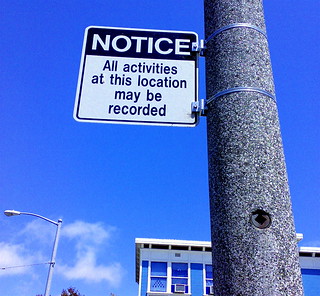The Formation of a New Discipline
It was a sentiment repeated several times throughout the Learning Analytics and Knowledge 2012 conference: this could the beginning of a new discipline. It’s something I’ve heard at recent big data events too (namely at O’Reilly Media’s Strata conferences): we are forming a new field, one with new tools and new practices and new objects of inquiry.
Of course, neither data nor analytics are particularly new. There’s a lengthy history of scholarly and industry production here. But in the case of data science, much of that has been “business intelligence.” In the case of learning analytics, it’s “educational data mining.” But circumstances are different now, so the argument goes; what we’re doing here is new.
The newness of it all can be rather exhilarating, particularly as it means that gatherings around these topics are small (small, but in the case of LAK12, significantly larger than the previous year’s conference). That provides a certain level of intimacy and a concentration of intellectual power and expertise. It means too that the sessions and hallway conversations seem to be even weightier than usual. It’s important after all, at the beginning of a new discipline, to get things right.
That makes a question that George Siemens asked during his keynote particularly significant: “Are we at a stage where learning analytics is going to lock down and reinforce everything we don’t like about the current education system?”
What Is Learning Analytics?
What is learning analytics – as a field of study, as a practice, as a set of tools, as a way to collect and analyze educational data? What are we tracking, and to what end?
The answer, oft-repeated at the conference, was “data exhaust” – that is, all the digital traces from learners’ online activities: where they go, what they do, what they say, who they’re connected to, who they interact with, what they read, what they write, where they linger, where they bail. (Formally, that’s (social) network analysis, discourse analysis, content analysis, and context analysis, for starters.)
Clearly the amount of data exhaust that all of us leave behind makes for an incredible opportunity for learning analytics, something I’ve written about repeatedly. And yet, somewhat ironically I’d say, while learning has never been confined solely to the classroom, it seems as though what many institutions (and researchers) are tracking in terms of developing learning analytics remains focused on the interactions of students and professors within their LMSes. How often do students log in? How often do they post in discussion boards? How long do they stay on the site? What do they click on?
If the focus of “what we’re tracking” is on the learning management system, the focus of “to what end” might be equally telling. In many cases, the “why we care” about learning analytics seems to focus on attempts to boost “student retention” and “course completion.” (The more often students log in to the LMS and the longer they stay there, the more likely they are to pass the class.) And while I won’t argue these metrics aren’t important and, sure, you can say that this is all connected to “learning,” it’s necessarily not the same thing. I realize that retention statistics matter to administrators; I realize it matters to the bottom line of all institutions – for-profit and not-for-profit. (Heck, it matters to students too.) And I realize too that completing a course should mean that students have learned something. But I’d hope the goal of learning analytics isn’t simply on boosting the graduation rate. I hope we can support student learning.
Even after spending much of my week with the learning analytics crowd, I still wonder: what are we talking about when we say "learning analytics"? What do we mean by the adjective “learning”?
Selling Learning Analytics
If a clear definition wasn’t really obvious at LAK12, it could be because in most cases (grad students excepted) the learner voice – or at least the student voice, I really should say – was largely absent from the conversation. That’s not that uncommon, I suppose, in many an ed-tech discussion.
But I fear (again) that data and analytics will be something we do to students, rather than do for them or do with them. I fear we’ll neglect (in the footsteps of much of the Internet) to let students dictate the conditions by which these analytics are even derived. As Sheila MacNeil asked following one of the presentations, “Do we tell students what data we collect and how we are going to use it?” Do students control and do they own their learning data?
I think that’s why the quantified self movement seems an appealing entry into learning analytics for me. It implies personal ownership and personal control. It might even require a personal definition of “learning.” It certainly requires setting personal goals. It means learning to read and build visualizations. (Here are a few tools to get you started in that regard from LAK12 keynoter Katy Börner.) It means learning analytics (verb-direct object, not adjective-noun, I mean). It means learning statistics.
The latest Horizon Report put the time-to-adoption of learning analytics at two to three years. That’s at an institutional level, mind you, not at the level of our individual readiness as learners to craft our own data dashboards and data visualizations. Frankly, I’m not sure which will move towards adoption more quickly. Nor am I certain how the new field of learning analytics will develop in light of institutional inertia, disciplinary siloes, or vendor lock-in. I'm not certain how the field will develop in terms of other disciplines either. As someone kept asking during the Q&A panel at sessions, “What’s the role of learning theory here?” I'd add, "How do we take theory in to practice?" And how do we do so with transparency – as scholars, institutions, vendors – and with reciprocity – as teachers and as learners?
Lots of questions, I realize -- all of which are ever-so-important we consider, particularly if we're hoping to build something new and transformative here with learning analytics -- something more than an expensive feature upgrade to an institution's LMS.
Disclosure: The organizers of LAK12 paid for my travel and accomodations at the event.
Photo credits: Jessica Curtin, John Manoogian

